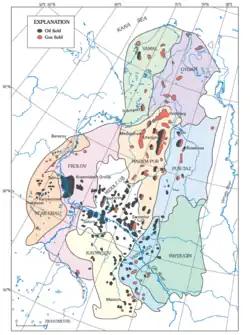| Yamburg gas field | |
|---|---|
| Country | Russia |
| Region | Yamalo-Nenets Autonomous Okrug |
| Offshore/onshore | Onshore |
| Coordinates | 67°54′N 74°51′E / 67.9°N 74.85°E |
| Operators | Gazprom Dobycha Yamburg |
| Partners | Gazprom |
| Field history | |
| Discovery | 1969 |
| Start of production | 1986 |
| Production | |
| Estimated gas in place | 289,542×109 cu ft (8,198.9×109 m3) |
| Producing formations | Upper Cretaceous reservoir rocks |

The Yamburg gas field is the world's third largest natural gas field located 148.5 kilometres (92.3 mi) north of the Arctic Circle in the Tazovsky and Nadymsky districts in Yamalo-Nenets Autonomous Okrug, Tyumen Oblast, Russia.[1]
History
It was discovered in 1969 by Vasiliy Podshibyakin. Development of the field started in 1980, production started in 1986.[2] It is operated by Gazprom Dobycha Yamburg, a subsidiary of Gazprom.
Reserves
The total geological reserves are estimated at 8.2 trillion cubic meters of natural gas, mostly from Upper Cretaceous reservoir rocks at depths of 1,000–1,210 metres (3,280–3,970 ft). The gas field has an area of around 170 kilometres (110 mi) by 50 kilometres (31 mi).
Operations
Since starting operations, Yamburg has produced more than 4.5 trillion cubic meters of natural gas as of October 2012.[3] In later years, production has moved to the peripheral areas of the field, such as the Aneryakhinskaya and Kharvutinskaya areas. The main export pipeline from the Yamburg field is called the Progress pipeline.[4]
References
- ↑ David Bamford (24 July 2008). "Gas and UK Gas Storage". OilVoice. Retrieved 31 October 2009.
- ↑ Wilson, David (1983). The demand for energy in the Soviet Union. Taylor & Francis. pp. 275–276. ISBN 978-0-7099-2704-4. Retrieved 31 October 2009.
- ↑ "01.10.2012 – We are 28 year-old company!". Gazprom. Retrieved 5 March 2014.
- ↑ Vladimir Socor (15 July 1986). "Extensive Romanian Commitments to Cmea Joint Projects in the USSR". RFE/RL. Retrieved 27 December 2009.